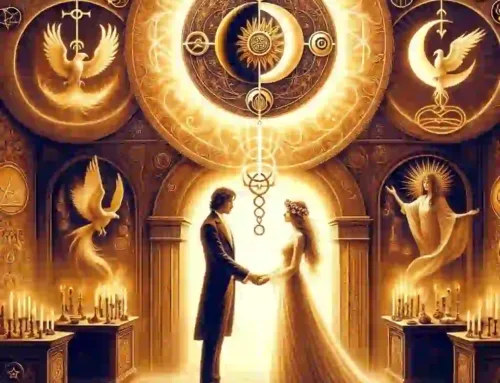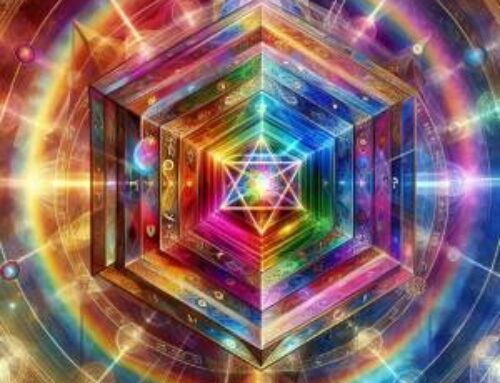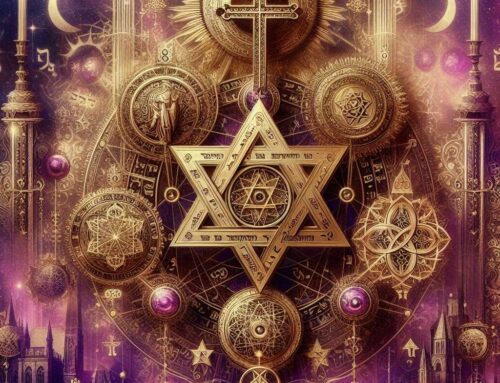Contents
- 1 Historical Intersections of Rosicrucianism and Gnosticism
- 2 The Gnostic Influence on Rosicrucian Esotericism
- 3 Comparative Analysis of Doctrines
- 4 Spiritual Alchemy and Gnostic Transformation
- 5 Rosicrucianism’s Quest for Gnosis
- 6 Modern Syncretism and Interpretations
- 7 Conclusion of “Are Rosicrucians Gnostics?”
- 8 FAQ
We want to explore the question: “Are Rosicrucians Gnostics?”. When one ponders whether Rosicrucians are Gnostics, we embark on an esoteric exploration that transcends the boundaries of traditional religious dogma. The Rosicrucian Order, with its mystical symbols, rituals, and alchemical teachings, shares an enigmatic kinship with ancient Gnosticism—a spiritual philosophy predicated on the direct experiential knowledge of the divine, known as gnosis. Both traditions herald the pursuit of enlightenment as the supreme goal, guiding adherents on an inward journey to discover profound truths concealed within the self and the cosmos.
The connection between Rosicrucianism and Gnosticism is woven into the very fabric of Western esotericism. With its roots deeply embedded in the mysteries of the ancient world, Gnosticism presents a worldview where salvation is achieved through knowledge and liberation from the material plane. Similarly, Rosicrucians advocate for a path of spiritual ascension through the understanding and application of hermetic wisdom, often paralleling the Gnostic search for redemption from the illusory confines of the physical world.
Both paths offer a beacon of light to those seeking to navigate the labyrinth of existential questions, each contributing a unique perspective to the universal quest for divine knowledge. The examination of their doctrines, symbols, and practices reveals a tapestry of shared motifs and philosophies that suggest a subtle yet profound relationship. This article delves into the heart of this connection, exploring how the Rosicrucian pursuit of wisdom aligns with Gnostic principles and what distinctions set them apart in the grand spectrum of spiritual traditions.

Historical Intersections of Rosicrucianism and Gnosticism
Shared Origins and Evolutions: Rosicrucianism, a spiritual movement that emerged in the early 17th century, displays an intricate relationship with Gnosticism, which dates back to the first centuries of the Common Era. While the two are separate entities with distinct evolutions, they intersect at various points in history, sharing a common thread in their quest for esoteric knowledge and spiritual liberation.
Cross-Pollination of Esoteric Traditions: The Rosicrucian manifestos of the 1600s emerged during a period when Gnostic texts were being rediscovered, leading to a cross-pollination of ideas. This exchange influenced the development of Rosicrucian thought, incorporating Gnostic concepts of spiritual realms, dualistic cosmology, and the inner knowledge of the divine.
Rosicrucians and Gnostic Groups: Let’s explore the question “Are Rosicrucians Gnostics?” in a comparative Study: While not directly descended from Gnostic groups, the Rosicrucians embraced many parallel beliefs, including the notion of a spark of divinity within each person and the importance of personal revelation over institutionalized faith. Both Gnosticism and Rosicrucianism challenged the religious orthodoxy of their times by emphasizing the individual’s direct connection with the divine.
The Gnostic Influence on Rosicrucian Esotericism
Core Philosophical Resonances
The intricate tapestry of Rosicrucianism is interwoven with threads of Gnostic thought, evident in its philosophical outlook and spiritual practice. Both traditions emphasize the importance of inner knowledge or gnosis as the path to enlightenment and salvation, transcending the physical and material confines to reach a divine state of being.
Symbolism and Mystical Interpretation
Rosicrucianism, much like Gnosticism, utilizes a rich language of symbols and allegories to convey spiritual truths. These symbols serve as keys to unlocking deeper dimensions of consciousness and understanding the universe’s mystical aspects.
Gnosis: The Quest for Divine Knowledge
At the heart of Rosicrucianism is the pursuit of gnosis—a direct experiential knowledge of the divine. This mirrors the Gnostic tradition where salvation is attained not through faith alone but through an intimate understanding and realization of divine truths.
Comparative Analysis of Doctrines
Salvation Through Knowledge vs. Faith
One of the pivotal distinctions between Gnostic and Rosicrucian beliefs and mainstream religious doctrines is the emphasis on salvation through knowledge rather than faith. Gnosticism posits that spiritual liberation comes from understanding the nature of the divine spark within, a concept echoed in Rosicrucian teachings.
Esoteric Practices and Their Purposes
Both Gnosticism and Rosicrucianism engage in esoteric practices aimed at spiritual advancement and enlightenment. However, their methodologies and the interpretation of their effects may vary, reflecting each tradition’s unique perspectives on the cosmos, humanity’s role in it, and the nature of the divine.
The Role of the Demiurge
A key component of Gnostic cosmology is the concept of the Demiurge, a creator god who fashioned the material world as a realm of imperfection. While Rosicrucianism does not explicitly adopt this view, it shares the Gnostic disdain for materialism, emphasizing a spiritual ascension beyond the physical.
Spiritual Alchemy and Gnostic Transformation
The Alchemical Journey Towards Enlightenment
In both Rosicrucianism and Gnosticism, alchemy plays a crucial role, albeit approached with different intents and understandings. Alchemy for Rosicrucians is not just the transmutation of base metals into gold but a metaphor for the spiritual journey of self-transformation. It represents the purification and perfection of the human soul, mirroring the Gnostic pursuit of gnosis – a direct intuitive knowledge of the Divine.
Inner Alchemy as the Path to Gnosis
Rosicrucians view the alchemical process as an inner transformation that aligns the practitioner with divine will, transcending the physical to reach a state of spiritual enlightenment. This inner alchemy involves stages of spiritual development that are remarkably similar to the Gnostic path of ascension through knowledge and understanding of the divine spark within.
The Role of Symbols and Mystical Practices
Both traditions use symbols and mystical practices to guide the seeker through their spiritual journey. The symbols and allegories found in alchemical texts serve as maps for the Rosicrucian and Gnostic paths, illustrating the stages of spiritual awakening and the eventual realization of one’s divine nature.
Rosicrucianism’s Quest for Gnosis
Seeking Knowledge Beyond the Material
At its core, Rosicrucianism embodies the quest for gnosis – a profound understanding of spiritual truths that transcend conventional religious teachings. This quest is not unlike the Gnostic search for direct experiential knowledge of the divine, positioning Rosicrucians as modern-day Gnostics in their pursuit of enlightenment.
Integration of Gnostic Elements
Rosicrucians integrate elements of Gnosticism, such as the emphasis on personal spiritual experience and the rejection of materialism, into their practice. By focusing on the transformation of the self rather than adherence to external dogmas, Rosicrucianism aligns with Gnostic principles of spiritual liberation through knowledge.
The Divine Spark Within
A key Gnostic belief that resonates with Rosicrucianism is the concept of the divine spark within each individual, a fragment of the divine that guides one’s journey back to the source. Rosicrucian teachings and practices aim to awaken and cultivate this inner divinity, leading the practitioner to a state of union with the universal consciousness.
Modern Syncretism and Interpretations
The synthesis of Rosicrucianism with Gnosticism in contemporary spiritual practices demonstrates a profound syncretism that enriches modern esoteric thought. Rosicrucians, embracing the core principles of Gnosticism, have contributed to a nuanced understanding of spiritual truths, emphasizing direct personal experience of the divine over institutionalized religious doctrine. This modern interpretation continues to evolve, integrating insights from both traditions to form a cohesive path of spiritual awakening.
Rosicrucian rituals infused with Gnostic elements offer initiates a pathway to spiritual enlightenment that mirrors the Gnostic quest for divine knowledge. These rituals, while rooted in Rosicrucian tradition, often incorporate Gnostic symbolism and concepts, reflecting the shared heritage of seeking liberation from material existence and an awakening to the spiritual reality.
In the age of enlightenment where spiritual seekers navigate through an abundance of esoteric teachings, Rosicrucianism’s incorporation of Gnostic principles stands as a beacon for those aspiring to transcend the material and realize their inherent divine nature. The adaptability and inclusiveness of Rosicrucian thought have allowed it to absorb and reinterpret Gnostic wisdom, making it relevant to contemporary spiritual explorers.
Conclusion of “Are Rosicrucians Gnostics?”
Exploring the connection between Rosicrucianism and Gnosticism reveals a rich tapestry of shared ideals, symbols, and aspirations. While Rosicrucians may not identify strictly as Gnostics, the profound influence of Gnostic thought on Rosicrucian philosophy is undeniable. Both traditions herald the pursuit of gnosis — a direct personal experience of the divine — as the ultimate path to enlightenment. Through their rituals, teachings, and practices, Rosicrucians embody the Gnostic spirit of seeking knowledge beyond the physical, aiming for spiritual liberation and the realization of one’s divine essence.
This journey through the intersections of Rosicrucianism and Gnosticism illuminates the ways in which ancient wisdom is continuously reinterpreted to guide seekers on their path to enlightenment. As we navigate the complexities of the modern world, the synthesis of these spiritual traditions offers a beacon of hope — a promise of a deeper understanding of the universe and our place within it.
FAQ
Are Rosicrucians considered Gnostics?
Rosicrucians share many principles with Gnosticism, especially the pursuit of gnosis, but they maintain their unique identity with a broader inclusion of esoteric teachings.
What is gnosis in the context of Rosicrucianism?
Gnosis refers to direct, personal knowledge of the divine, a cornerstone of both Gnostic and Rosicrucian paths.
How do Rosicrucian rituals reflect Gnostic principles?
Rosicrucian rituals often incorporate elements of Gnostic symbolism and aim to facilitate personal spiritual transformation, mirroring the Gnostic quest for enlightenment.
Can one practice Rosicrucianism and still align with Gnostic teachings
Yes, many seekers integrate the teachings of both paths, embracing Rosicrucian practices while adhering to the Gnostic emphasis on personal divine experience.
How has modern syncretism affected the practice of Rosicrucianism?
Modern syncretism has enriched Rosicrucianism with a diversity of spiritual insights, including Gnostic principles, making it a dynamic path that evolves with contemporary spiritual exploration.





